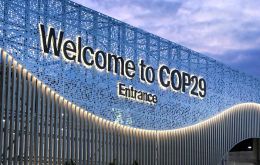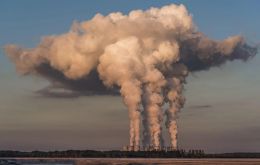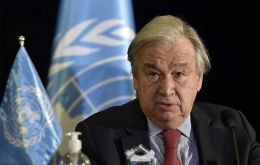MercoPress. South Atlantic News Agency
Tag: Climate change
-
Monday, January 13th 2025 - 06:06 UTC
Climate change watchdogs concur 2024 was the hottest year ever

Last year was the hottest on record and it even surpassed the global warming limit, the European Union's Copernicus Earth Observation Program and the World Meteorological Organization (WMO) concurred. In addition, 2023 and 2024 saw average global temperatures exceed the internationally agreed 1.5 degrees Celsius warming threshold
-
Tuesday, December 31st 2024 - 10:55 UTC
La Niña projected to take its toll in the Southern Cone

Meteorologists foresee that the La Niña weather phenomenon will not go unnoticed in the Southern Cone next year after the Brazilian agency Metsul reported signs of unusual activity in the Pacific Ocean. The main impact will be reflected in mercurial temperatures, MetSul's warning noted.
-
Wednesday, December 11th 2024 - 10:05 UTC
International Soil and Water Forum opened in Bangkok to tackle water scarcity and soil degradation

The first International Soil and Water Forum opened this week in Bangkok to map out concrete measures to boost global efforts in managing water scarcity and reversing soil degradation – both critical for global food security and environmental health.
-
Saturday, December 7th 2024 - 10:44 UTC
Fifth global conference fails to reach deal on curbing plastic pollution

The fifth and intended final meeting of the Intergovernmental Negotiating Committee (INC) on plastic pollution in Busan, South Korea, concluded with negotiators unable to reach a deal on a new global treaty to curb plastic pollution. The failure of this fifth session of the INC, or INC-5, to deliver on its mandate highlights the persistent challenges of reaching a consensus to solve the growing issue of global plastics pollution.
-
Wednesday, November 20th 2024 - 09:41 UTC
Lula urges developed countries to up their climate contributions

Brazilian President Luiz Inácio da Silva insisted Tuesday that G20 developed countries should bring forward by up to ten years the climate neutrality targets currently set for 2050, Agencia Brasil reported. He made those remarks during his appearance at the Group's Summit in Rio de Janeiro. “To the developed members of the G20, I propose that you bring forward your climate neutrality targets from 2050 to 2040 or even 2045,” Lula stressed during a panel on sustainable development and energy transition.
-
Wednesday, November 13th 2024 - 09:38 UTC
Brazil has its own space at COP29 in Baku, Azerbaijan

As the Conference of Parties 29 (COP29) opened in Baku, Azerbaijan, this week, Brazil assumed a leading position at the event by opening its Pathways to Ecological Transformation space to discuss the South American country's initiatives to tackle climate change, Agencia Brasil reported.
-
Friday, November 8th 2024 - 09:17 UTC
Cutdown in carbon dioxide emissions reported in Brazil last year

South America's largest country cut down its carbon dioxide equivalent (GtCO2e) emissions by 12% in 2023 compared to the previous year, Agencia Brasil reported Thursday citing data from the Climate Observatory. In 2023, Brazil emitted 2.3 billion tons of greenhouse gases, already a reduction from 2022's 2.6 billion tons.
-
Wednesday, October 30th 2024 - 10:09 UTC
Guterres urges countries to prioritize nature over businesses

United Nations (UN) Secretary-General António Guterres urged countries to set aside their business models and prioritize nature, which is neither infinite nor free. He made those remarks in the Colombian city of Cali during his appearance at the Global Biodiversity Conference (COP 16).
-
Monday, September 16th 2024 - 14:51 UTC
Brazil gripped by “climate terrorism,” says Minister Silva

South America's largest country is going through a wave of 21st Century “terrorism” which capitalizes on the high temperatures and low humidity to set large areas on fire damaging people's health, biodiversity and destroying forests, Climate Change Minister Marina Silva sqaid Sunday, Agencia Brasil reported. The official referred to this phenomenon as “climate terrorism.”
-
Monday, September 2nd 2024 - 11:35 UTC
Mass gas emission cut proposed in Brazil by 2035

According to a study by the Climate Observatory network, Brazil needs to cut greenhouse gas emissions by 92% by 2035 if South America's largest country is to make a fair contribution to limiting global warming to 1.5 degrees Celsius (ºC), Agencia Brasil reported. This target is based on 2005 emissions of 2.4 billion net tons, reducing the annual limit to 200 million net tons, it was also explained.
